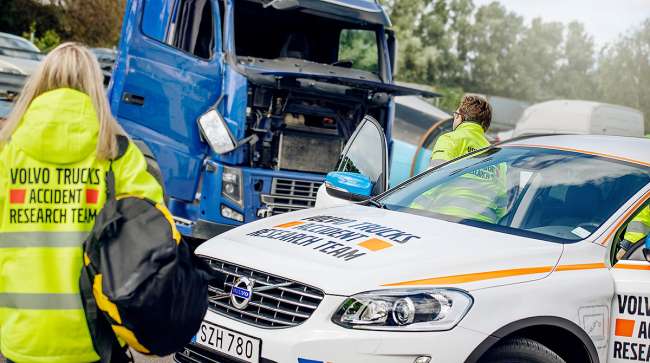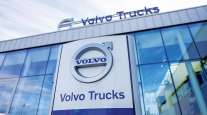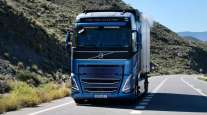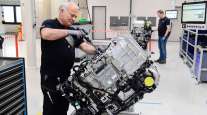Senior Reporter
Volvo Marks Major Anniversaries of Connected Technology, Accident Research

[Stay on top of transportation news: Get TTNews in your inbox.]
Volvo Group celebrated a milestone in the number of connected vehicles sold to customers over the past 25 years, while its truck unit, Volvo Trucks, celebrated its 50th anniversary of performing accident reconstruction and analysis.
Volvo Group has delivered more than 1 million connected trucks, buses and construction equipment. The large amount of data collected is used to improve productivity by increasing vehicle and machine uptime, reducing emissions and noise, as well as improving traffic and site safety, the Gothenburg, Sweden-based company reported.
The Volvo Group today reached more than 1,000,000 connected assets, including trucks, buses, construction equipment and engines! #volvogroupmillion Read more: https://t.co/u9WcZWTJV2
— Volvo Group NA (@VolvoGroupNA) October 3, 2019
“Volvo Group was the first in our business to offer customers telematics solutions when Dynafleet was introduced in 1994,” a Volvo spokesperson told Transport Topics.
The Oct. 3 handover ceremony of four electric excavators to the Danish customer GSV Materieludlejning pushed the total over the milestone threshold, the company noted.
“The connected solutions bring increased vehicle and construction equipment uptime for our customers, better safety for drivers, operators and other road users and, of course, less emissions of carbon dioxide. The first million connected assets is only the start, we are committed to remain a leader in this field,” Volvo Group CEO Martin Lundstedt said.
Thanks to the collected data, wear on crucial parts can be predicted, services planned and spare parts ordered in advance, reducing downtime for the owner, thus leading to increased productivity. The Volvo Connect system combines all digital and connected services for Volvo’s truck customers into a single interface.
At the same time, connected Volvo buses use downloaded data to comply with local traffic restrictions such as emission zones, noise zones and speed limits.
“Volvo Group is a pioneer in connected vehicles and we use the knowledge and insights we get from connectivity in strategic alliances with customers and other partners to speed up the innovation cycle,” Lars Stenqvist, chief technology officer at Volvo Group, said in a release.
For Swedish customer NCC, a weight control solution has been developed, allowing the construction equipment operator and the truck driver to monitor the load capacity in real time. The result is higher productivity and lower environmental impact.
In 1969, our Accident Research Team was created to analyze the causes of traffic accidents. Their work over the past 50 years continues to help us develop new safety innovations that are making trucks and transport safer. https://t.co/SEeLVUX5FZ pic.twitter.com/gcd0MF1qh7 — Volvo Trucks (@VolvoTrucks) October 2, 2019
“Connectivity is transforming the transportation industry. Insights from gathered data can be turned into value for our customers, and society as a whole, and make transportation more productive, more sustainable and safer,” said Anna Westerberg, senior vice president at Volvo Group Connected Solutions.
Volvo Group has 100,000 employees, 12 brands and operates in 190 markets.
Meanwhile, Volvo Trucks since 1969 has systematically gathered, analyzed and acted upon in-depth information about real-life traffic accidents. The knowledge gained provides unique value in the development of safety systems and future vehicle designs, with the objective of making trucks and transport safer.
“Every year 1.35 million people are killed globally in traffic accidents. This is something we take very seriously,” said Anna Wrige Berling, traffic and product safety director at Volvo Trucks. “Investigations by the Accident Research Team contribute valuable insight which ultimately helps give truck drivers a safer working environment and improve traffic safety for all road users. In addition, the work supports our safety vision that there should be no accidents involving Volvo trucks.”
Anna Theander, the Accident Research Team leader, said: “Although the ART does not by itself develop safety systems, our safety experts’ understanding of complex accident scenarios gives the product development teams additional competence and confidence to create solutions that go beyond what was initially thought to be required.”
Want more news? Listen to today's daily briefing:




